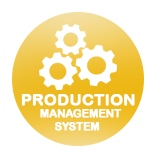
Production system software, also known as manufacturing execution system (MES) software or production management software, is a specialized software solution designed to streamline and optimize various aspects of production and manufacturing operations. It offers comprehensive tools and features to assist manufacturers in managing production planning, scheduling, inventory, quality control, and overall production processes efficiently.
Key Features
- Production Planning and Scheduling :- Production system software provides tools to plan and schedule production activities. It helps manufacturers create production orders, define workflows, allocate resources, and establish production timelines. This feature ensures optimal utilization of resources, minimizes downtime, and enables efficient production scheduling.
- Inventory Management :- The software offers inventory management features to track and manage raw materials, work-in-progress (WIP), and finished goods. It helps manufacturers maintain accurate inventory levels, monitor material availability, and generate reports on stock status. This ensures smooth production flow and prevents stockouts or excess inventory.
- Shop Floor Control :- Production system software includes shop floor control functionalities that facilitate real-time monitoring and control of production activities. It provides visibility into the production floor, allowing supervisors to track progress, monitor machine performance, and address any production issues promptly. Real-time data collection from machines and operators enables better decision-making and process optimization.
- Quality Control and Traceability :- The software incorporates quality control features to ensure adherence to quality standards and regulatory requirements. It provides tools for tracking product quality, conducting inspections, and capturing quality data. Additionally, production system software helps maintain traceability by recording and tracking materials, components, and production processes throughout the supply chain.
- Performance Analytics and Reporting :- Production system software offers robust reporting and analytics capabilities. It generates comprehensive reports on production output, efficiency, cycle times, quality metrics, and other key performance indicators. These reports provide insights into production performance, identify bottlenecks, and help manufacturers make data-driven decisions for continuous improvement.
- Equipment Maintenance and Asset Management :- The software helps manage equipment maintenance and asset utilization. It provides features to schedule preventive maintenance, track equipment downtime, and manage spare parts inventory. This ensures optimal equipment performance, minimizes breakdowns, and maximizes overall equipment effectiveness (OEE).
- Integration and Connectivity :- Production system software often integrates with other systems, such as enterprise resource planning (ERP) software, supply chain management (SCM) systems, and machine monitoring systems. Integration allows for seamless data exchange, facilitates end-to-end visibility, and supports efficient information flow across different departments and systems.
Benefits of Production System Software:
- Improved Operational Efficiency :- By automating manual processes, providing real-time data, and optimizing production workflows, production system software improves operational efficiency. It reduces production lead times, minimizes waste, and enhances resource utilization.
- Enhanced Production Planning and Scheduling :- The software enables manufacturers to plan and schedule production activities more effectively. It ensures better coordination, optimizes resource allocation, and allows for efficient production sequencing, resulting in improved on-time delivery and customer satisfaction.
- Optimal Inventory Management :- Production system software helps manufacturers maintain accurate inventory levels, prevent stockouts or overstocking, and optimize inventory turnover. This reduces carrying costs, improves cash flow, and ensures timely availability of materials for production.
- Quality Control and Compliance :- The software enables manufacturers to implement robust quality control processes, monitor quality metrics, and maintain compliance with industry standards and regulations. It helps identify quality issues early, reduce rework, and enhance overall product quality.
- Data-Driven Decision Making :- Production system software provides real-time data, performance analytics, and reporting capabilities. Manufacturers can analyze production data, identify trends, and make informed decisions to optimize processes, improve efficiency, and drive continuous improvement initiatives.
